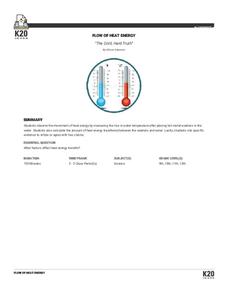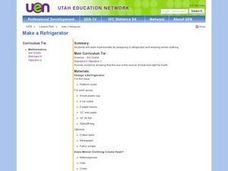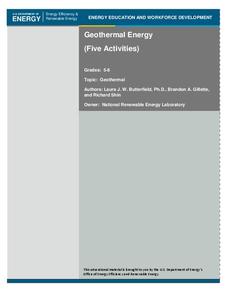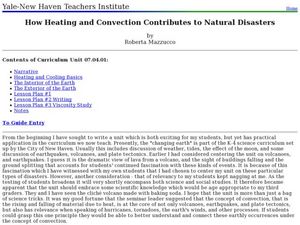K20 LEARN
The Cold, Hard Truth
Things are really getting heated in the lab! Science scholars scope out the facts about heat energy transfer using a simple lab from the K20 Center. Groups collaborate to observe temperature changes between hot metal and water, then use...
Texas State Energy Conservation Office
Investigation: Building a Parabolic-Trough Collector
Amateurs of alternative energy build a mini parabolic-trough solar energy collector and use it to heat water. Temperature is recorded over a three-minute period and the data is graphed and analyzed. Note that in order to paint aquarium...
Curated OER
Make a Refrigerator
Third graders explore the concept of heat transfer as experienced in wearing winter clothing and analyzing the refrigerator.
Curated OER
Melted Paintings
Another in the amazing series of lesson plans which use unique mediums! Students execute artwork on a non-traditional painting surface. They theorize what happen to their artwork if it is exposed to heat, then see what happens when they...
US Department of Energy
Geothermal Energy
With Earth Day quickly approaching, as well as many science fairs, why not challenge your class to investigate geothermal energy or other renewable energy resources? There are five driving questions explored in depth here, as well as...
Curated OER
Conduction, Convection and Radiation
Sixth graders listen to descriptions of types of heat to gain background knowledge In this heat lesson, 6th graders perform experiments to understand various types of heat transfer (convection, conduction and radiation.) Students assess...
It's About Time
What Drives the Plates?
It's getting hot in here! Lead your emerging geoscientists on a thrilling journey as they calculate liquid densities to determine forces that stimulate thermal plates from within the earth's crust. They explore effects of temperature on...
Discovery Education
Motion in the Ocean
How do temperature changes affect ocean currents? Scholars explore convection currents by demonstrating the flow of water in a baking dish. They use ice, heat, and food coloring to see currents. Then, they draw conclusions about their...
Curated OER
Heat Transfer & Phase Changes
In this heat transfer and phase change worksheet, students experiment with ice, salt, and milk to show the relationship between the temperature of a solution and its phase. Students turn milk from a liquid to a solid and graph the...
Curated OER
How Heating and Convection Contributes to Natural Disasters
Students study the basics of heating and cooling and how it pertains to the earth. In this global lesson students read the Magic Tree House book then create a chart of their findings.
Curated OER
Go With the Flow!
Learners experiment with heat transfer in a countercurrent system and describe the importance of conduction in heat-energy transfer.
Curated OER
Heat from Machines
Third graders continue their examination of the heat energy from machines. In groups, they make predictions on which machines might produce a measureable amount of heat. They take the temperatures of the various machines and record them...
Curated OER
Specific Heat Capacity of a Metal
Eleventh graders investigate the relationship between heat and energy transfer. They review terms including heat, work, calorimetry and the procedures for an experiment. After assembling the materials for the experiment, they observe...
Curated OER
Heat Misconceptions
Third graders determine that gloves do not provide heat, but rather, they insulate or hold in any heat that is in their hand. They discuss the different temperatures found in ecosystems around the world. What do animals that live in...
Curated OER
Driving Currents
Students conduct a variety of investigations to see how water, heat, and salinity affect the flow of the world's ocean currents,as well as, explore many factors that affect the flow of the world's ocean currents. They also describe in...
Curated OER
Calorimetry Lab
In this calorimetry lab, students apply the information read about a calorimeter to conduct a scientific investigation. Students record their data in a chart. Students use the information from the chart to calculate specific heat of...
Curated OER
Deep Ocean Currents
Students observe the interactions of different temperatures of water using colored ice and a thermometer and then compare the results with global ocean current solar heating. They identify where floating ice would be found in the ocean,...
Curated OER
Hot, Cold, Fresh and Salty
Pupils observe the effects of layering water and what is more or less saline than normal. In this geoscience lesson students create saline solutions, layer them and observe how the water becomes different temperatures in different layers.
Curated OER
Ocean Streams
The instructions for demonstrating ocean turnover are provided in this resource. You could set this up for your earth science class as part of a lecture on convection currents or as an explanation of how ocean currents form. An animation...
Carnegie Mellon University
Bathtub Model
Using a colorful infographic handout and a guide sheet, hold a class discussion about how a bathtub can serve as a model for the greenhouse effect created by Earth's atmosphere. Participants will understand that as energy or matter is...
Curated OER
Heat 1
In this heat worksheet, students determine the heat gained or lost when matter changes phases. Students review the energy flow through ecosystems by comparing trophic levels and food webs. This worksheet has 10 fill in the blank, 5 short...
Texas State Energy Conservation Office
Investigation: Insulation
Youngsters compare the heat-holding abilities of three different cans by insulating two with different materials and measuring the temperature change of hot water over a 20-minute period.
Science Geek
Basic Thermochemistry
Heat is more than just temperature, as viewers discover throughout a presentation about thermochemistry that emphasizes vocabulary. Definitions include joule, calorie, energy, enthalpy, calorimetry, exothermic and endothermic process,...
Curated OER
More on Conduction and Convection
Why do some items feel colder when they are the same temperature? How should you keep your soda cold? What makes the wind blow? These are just some of the things middle schoolers discover when completing a instructional activity on...

























